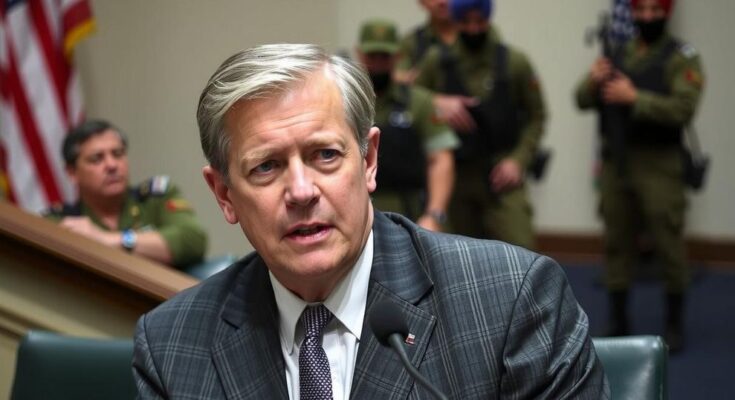The U.S. confirmed direct contact with Syrian rebel group Hayat Tahrir al-Sham (HTS) amid the regime’s collapse. Secretary of State Antony Blinken emphasized the need to address humanitarian concerns and prevent terrorism. Diplomatic efforts aimed at unifying regional partners underscore the U.S.’s role in shaping Syria’s future, despite rising tensions among various factions and external influences from Israel and Iran.
The United States recently confirmed direct contact with Hayat Tahrir al-Sham (HTS), a Syrian rebel group assumed to hold significant power in the conflict-ridden country. Secretary of State Antony Blinken disclosed this information during his diplomatic engagements in Jordan and highlighted discussions that focused on the ongoing search for American journalist Austin Tice, who has been missing in Syria for over a decade. The U.S. underscored the principles expected of any emerging Syrian government, emphasizing respect for all citizens’ rights, protection against terrorism, provision of humanitarian aid, and the secure disposal of chemical weapon stockpiles.
Blinken’s visit aimed to unify support for these principles amid the shifting political landscape following the unexpected ousting of Syrian President Bashar al-Assad. He noted the importance of international collaboration, signaling that the U.S. aims to play a pivotal role in charting a renewed direction for the Syrian populace. Despite the agreement on foundational principles, Blinken acknowledged significant challenges ahead, particularly with rising tensions between Turkish-backed forces and U.S.-allied Syrian Democratic Forces (SDF), which were recently hampered in their anti-ISIS efforts due to sporadic conflicts.
Moreover, Blinken met with various regional leaders to emphasize the necessity of preventing the resurgence of ISIS amid instability. He urged Iraqi Prime Minister Mohammed Shia al-Sudani to take robust action against Iranian-backed militias stirring discord in the region. The response to Israeli military actions in Syria further complicates the U.S.’s position, as Arab nations expressed disapproval over Israel’s incursions which they perceive as territorial aggression, contrasting with the U.S. stance that regards these actions as a precautionary measure.
The ongoing conflict in Syria has produced multiple factions and complexities, with various rebel groups vying for control amidst a turbulent political landscape. Hayat Tahrir al-Sham, considered a terrorist organization by the U.S. government, has emerged as a significant military actor in this environment. The recent upheaval following the collapse of President Assad’s regime has led to increased U.S. diplomatic activity in the region, particularly aimed at stabilizing the situation and addressing humanitarian concerns. The relationship between the U.S. and regional partners, coupled with the interactions with groups like HTS, illustrates the delicate balance the U.S. seeks to maintain while pursuing its strategic interests in the region.
The U.S. has taken a proactive stance in engaging with Syrian factions, maintaining communication with Hayat Tahrir al-Sham while advocating for principles aimed at establishing a new governance structure in Syria. Secretary Blinken’s diplomatic efforts underscore the U.S.’s commitment to preventing both ISIS’s resurgence and regional instability caused by competing interests among military groups. The intricate dynamics of U.S. relations with both regional partners and adversaries, particularly in context to Israeli military actions and Iranian influence, highlight the ongoing challenges in achieving a peaceful resolution in Syria. Ultimately, the success of these diplomatic strategies will depend on continued collaboration and timely interventions from all stakeholders involved in the Syrian crisis.
Original Source: www.cnn.com




